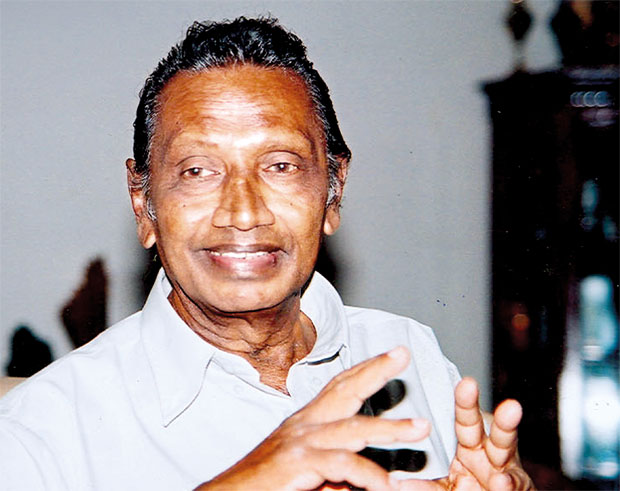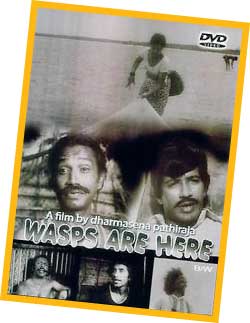Reply To:
Name - Reply Comment

 In Ananda Abeynayake’s Kande Gedara (scripted by Somaweera Senanayake) there is a servant to the two protagonists who is casually referred to as “Kalagune” (for what reason, we are never told). The protagonists, an ageing couple (the father, played by Rohana Baddage, is placid and friendly, tolerant of everyone, including his wife, played by Ramya Wanigasekara, who’s more hostile and grasping), have three indulgent children, one of whom has a conniving father-in-law who, acting above his station in life, garbles up his Sinhala and English drunkenly and calls this servant Karl.
In Ananda Abeynayake’s Kande Gedara (scripted by Somaweera Senanayake) there is a servant to the two protagonists who is casually referred to as “Kalagune” (for what reason, we are never told). The protagonists, an ageing couple (the father, played by Rohana Baddage, is placid and friendly, tolerant of everyone, including his wife, played by Ramya Wanigasekara, who’s more hostile and grasping), have three indulgent children, one of whom has a conniving father-in-law who, acting above his station in life, garbles up his Sinhala and English drunkenly and calls this servant Karl.
This father-in-law, played by Cyril Wickramage, is a distillation of every tragicomic aspect to the story. A conman who’s almost caught more than once, he gives the impression of being a well-meaning, unapologetic, expert trickster, and he is: more frail than evil, more misguided than misunderstood. Probably no other actor could have depicted him so well back then.
It happened in Sath Samudura, one of his first films, and it happened again in Bambaru Avith 10 years later. In both he realises the futility of loving a woman who can never love him back
Cyril Wickramage is what one can call an instinctive actor. In performance after performance he makes you think he’s giving less than what he has. But he never does. Just when you think he’ll stop displaying those hysterics and emotional outbursts he’s very much capable of, he instead does something intensely cathartic. It happened in Sath Samudura, one of his first films, and it happened again in Bambaru Avith 10 years later.
In both he realises the futility of loving a woman who can never love him back, and in both rants and raves against his fate and then triumphs over life, and the need to seek commiseration for his sorrows, by sailing and diving, literally, to his death. That’s his niche: his outbursts are enough to convince us that he’s distraught or unhappy or (as Kande Gedara showed) crafty and conniving, but never to the extent where we believe him to be a stereotypical talker or faker. He is what his instincts have us believe of him.
And to a considerable extent, those instincts came to him from his childhood, one that was spent in the village and away from the metropolis. Born in Kohilagedara in the Kurunegala District on January 26, 1932, he grew up on a diet of Sokari, Nurti, and Nadagam, patronising them as drama troupe after troupe travelled from Negombo to his home town. “We watched and revelled in them. During Avurudu we’d look forward to Nurti plays.
No, we never dreamt of becoming actors, onstage or on screen, but my friends and I made these outings an integral part of our common experience. We watched them for the fun of watching them, to be honest.” That was the kind of encounters which Joe Abeywickrama, in Ratnapura, would indulge in. Like Abeywickrama, Cyril didn’t get to watch a great many movies: “There was the Imperial Theatre in Kurunegala town. We didn’t see English films, only the Sinhala and Tamil ones.” He was about 15 when the Minerva Players made and released Kadawunu Poronduwa. (Perhaps it was the symbiotic relationship between these and the Nurtis he looked forward to that appealed to him.)
When television came to Sri Lanka, and Wickramage was selected to play various secondary characters in our first TV serials, Pathiraja was there with him
But it wasn’t acting that got to him as a career: it was teaching. Having flirted with the idea of joining the Army (which children his age usually fantasised about at his age), he qualified from the Peradeniya Training College after a two-year course. Thereafter he was employed at various institutions, including the Ratmalana Deaf School and Wesley College, Colombo. All in all he would have taught at seven such schools, and all of them got him deep into not just teaching, but also another field that was linked to his childhood encounters onstage: music.
 “I mastered the violin and later dancing during those years. And of all the schools I taught at, it was Wesley that got me thinking seriously about acting.” The latter school got him into contact with Ananda Samarakoon, who had come to watch a play, had seen Wickramage, and had beckoned him to the theatre.
“I mastered the violin and later dancing during those years. And of all the schools I taught at, it was Wesley that got me thinking seriously about acting.” The latter school got him into contact with Ananda Samarakoon, who had come to watch a play, had seen Wickramage, and had beckoned him to the theatre.
While he was interested in the theatre at the time, however, it was the cinema which initiated him properly into the performing arts, when in 1965 he was cast opposite Vijitha Mallika in Kingsley Rajapakse’s Handapane. A minor role, it won him praise from those who knew him, including his colleagues, which paid dividends a year later when Siri Gunasinghe cast him opposite Swarna Mallawarachchi, Edmund Wijesinghe, and Somasiri Dehipitiya in Sath Samudura.
What I like most about Gunasinghe’s film, apart from its fidelity to a milieu that only documentary makers had explored before in our cinema, was its preference for silence and introspection over wordy conversations. In large part that was exemplified in the sequences with Wickramage’s character Gunadasa, who hankers after a woman who can never have him, fights with a brother and an insensitive sister-in-law (Mallawarachchi in her first outing), and is loved only by the mother (Denawaka Hamine). Wickramage had grown up on the verbal barrages of the Nurti theatre. The film and roles he clinched were worlds away from those barrages.
Cyril Wickramage is what one can call an instinctive actor. In performance after performance he makes you think he’s giving less than what he has. But he never does
To this end two people figured in his subsequent career: Dr Linus Dissanayake, the producer of Sath Samudura, and Dharmasena Pathiraja, who cast him in nearly every film of his from Ahas Gawwa. Aboard Sath Samudura as an Assistant Director was Vasantha Obeyesekere, who together with Dissanayake made his first film, Ves Gaththo, in 1970. I have unfortunately not seen Ves Gaththo, but I do know that the theme it tackled – the rift between education and employability – was tackled and realised more vividly in his second film, Valmath Wuwo.
Both these featured Wickramage and the latter of them had him perform a Nadagam song, probably a tribute to the plays he had watched as a child. Meanwhile, a second collaboration with Dissanayake resulted in Wickramage’s first directorial venture: Sihina Lowak, a love story that more than anything else is remembered for the Amaradeva-Mahagama Sekara classic, “Ma Mala Pasu.” An even bigger set of collaborations would follow with Dharmasena Pathiraja.
Pathiraja, in Bambaru Avith, cast Wickramage as an almost inverted version of Gunadasa from Sath Samudura: now more assertive, more brutal. Even though the plot doesn’t let us in on why he resents the anti-hero, Victor (Vijaya Kumaratunga), it is manifestly clear that he seethes with anger and jealousy when Helen (Malini Fonseka) falls in love with him. It may well be that Wickramage’s character (also called Cyril) can’t reciprocate Helen’s love for him the way that Victor can; or it may well be that there’s a political subtext, with Cyril’s milieu militating against Victor’s on the personal plane (sexual politics, after all, is politics). Either way, his love for the woman who rejects him blinds and in the end consumes him (we are not made to see whether he commits suicide, or whether he’s killed off by one of Victor’s goons), and also provokes the final tragic encounter in the film: between Victor and his enemy, the feudalistic Anton aiya (Joe Abeywickrama), killed off (again) by one of the former’s goons (Daya Tennakoon).
With Pathiraja, as one can see from the roles he was chosen for, he was cast in a different mould. Not surprisingly, Wickramage remembers the man with sincere delight. “No other director tried to weed out the false and romantic from his films as he did, I can tell you that. He came from the village, very much like I did, but he was adept at depicting the urban youth. He was in fact fascinated by how the city was being invaded and assailed by the village and how the city in turn tried to assimilate the village to its values. To this end he was faithful in his depictions of both locales. Other directors went for their share of criticism when it came to the settings and backdrops of their movies. Not Pathiraja.”
So when television came to Sri Lanka, and Wickramage was selected to play various secondary characters in our first TV serials, Pathiraja was there with him. I have not seen Wickramage in some of these serials, including La Hiru Dahasak (reputedly Sri Lanka’s second after Dimuthu Muthu), Sasara Sayuren (which won for him a Best Actor Award from Wijeya Newspapers), and even Manik Nadiya Gala Basi (where he’s a gem merchant consumed by idealism first and later greed and envy), but I have seen him in Kande Gedara,Elle Langa Walawwa, and Kadulla, the latter two of which trace the subtle interrelationships between the colonial bourgeoisie and the village peasantry and both of which were directed by Pathiraja.
I have not seen Wickramage in some of these serials, including La Hiru Dahasak (reputedly Sri Lanka’s second after Dimuthu Muthu), Sasara Sayuren, which won for him a Best Actor Award from Wijeya Newspapers
In Ella Langa Walawwa especially, which gives the impression of being made indifferently, in a hurry, he’s the centre that holds the narrative together as the man servant Appu Hamy, despite its various meanderings and confusions that culminate in what I consider to be a less than satisfactory ending.
As he mellowed, Cyril Wickramage let go of his youthful avatar and became the sagacious, empathetic man of few words. While he decries contemporary television shows, for instance, he is nevertheless a character actor in them, usually playing out the role of the friendly, concerned elder. He never speaks more than he has to, and never being wont to emotional outbursts he’s caught our attention as a side player in ways that youth can’t really exude and match.
This makes his admiration for Marlon Brando (“Brando was the only real actor in a Shakespearean cast in the 1953 adaptation of Julius Caesar,” he told me frankly) all the more mystifying. He’s certainly no Brando, and he is, as I pointed out to a friend of mine around a year ago, as far away from the cinema of brawn as Gregory Peck was from John Wayne, if we are to take a metaphor and point of comparison from the American cinema of the 1950s: the decade in which he bloomed.